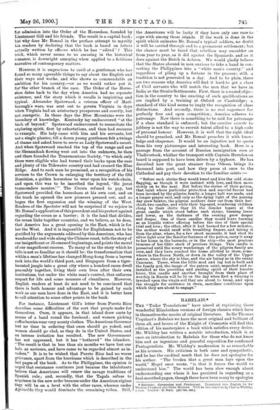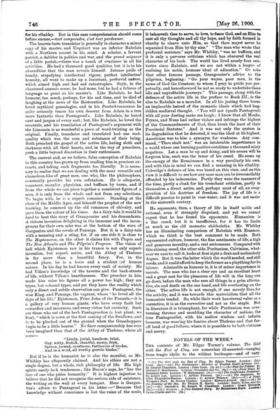RABELAIS.*
THE "Tudor Translations" have aimed at reprinting those wonderful Elizabethan versions of foreign classics which have in themselves the merits of original literature. In Sir Thomas Urquhart's Rabelais we have the most original and brilliant of them all, and lovers of the Knight of Cromartie will find this edition of his masterpiece a book which satisfies every desire. Mr. Whibley has written a notable introduction, which is at once an introduction to Rabelais for those who do not know him and an ingenious and graceful exposition for confirmed Pantagruelists. Mr. Whibley's moderation is as remarkable as his acumen. His criticism is both sane and sympathetic, and he has the cardinal merit that he • does not apologise for' his author. "The burden that a great man lays upon the world," Hegel once wrote, "is that it forces the world to
understand him." The world has been slow enough about • :understanding one whom it has persisted in regarding as a • foul-mouthed pagan, though there have been many to apologise
• Rabditis : Garaantua and PantagrueL Translated Into English by Sir 'Thomas Urquhart and Peter Mattel's. With an Introduction by Char:es Whibley. vuls. London : D. Nutt. [52 10. net.]
for his ribaldry. But in this case comprehension should come before excuse,—taut comprendre, c'est tout parclonner.
The heaven-born translator is generally in character a minor copy of his master, and Urquhart was an inferior Rabelais with a Northern accent in his mind. A scholar, a fervent patriot, a dabbler in politics and war, and the grand seigneur of a little parish,—there was a touch of craziness in all his activities. He had a thousand good qualities, but it is in his absurdities that the man reveals himself. Intense pride of family, stupefying intellectual vigour, perfect intellectual honesty, all went to make up a luxuriant, perfervid nature, which aimed high and had sad catastrophes. Style, in the chastened antemic sense, he had none, but he had a fulness of language as great as his master's. Like Rabelais, he had humour, too much, perhaps, for his sad time, and he died of laughing at the news of the Restoration. Like Rabelais, he loved mythical genealogies, and in his Pantochronocanon he quite seriously traces his own descent from Adam in a tree more fantastic than Pantagruel's. Like Rabelais, he hated cant and jargon of every sort; but, like Rabelais, he loved the eccentric, and his translation of Pantagruel's argument with the Limousin is as wonderful a piece of word-twisting as the original. Finally, translator and translated had one root- quality which was the sum and substance of their being.
Both preached the gospel of the active life, hating sloth and darkness with all their hearts, and, in the way of preachers, push a little beyond discretion in their enthusiasm.
The current and, as we believe, false conception of Rabelais in this country has grown up from reading him in prurient ex- tracts, and taking such fragments too literally. It is neces- sary to realise that we are dealing with the most versatile and chameleon-like of great men, one who, like the philosophers; constantly provides his own refutation. He is allegorist, romancer, moralist, physician, and buffoon by turns, and if from the whole we can piece together a consistent figure of a man, it is only from the whole and not from any selections. To begin with, he is a superb romancer. Standing at the close of the Middle Ages, and himself the prophet of the new learning, he summed up the old romances of chivalry, and gave them the colour of his times. As a fairy-tale it would be hard to beat this story of Grangousier and his descendants. A riotous invention delighting in the immense and the incon- gruous for their own sake was at the bottom of the wars of Gargantua and the revels of Panurge. But it is a fairy-tale with a meaning and a sting, for, if on one side it is close to The Heptameron, on the other it claims kin with Utopia and The New Atlantis and The Pilgrim's Progress. The vision of hell which Epistemon saw in his trance is not only superb invention, but superb satire, and the Abbey of Theleme is far more than a beautiful fancy. For, in the second place, be is a lover and a student of human nature. In his day he had known every rank of society. He had Villon's knowledge of the taverns and the back-streets of life, without Villon's heartlessness. The preacher in him made him raise his figures all a power too high; they are types, but colossal types, and yet they have the reality which only a direct and subtle observation can give. Pantagruel, the wise King, and Panurge, the vagrant, whom "he loved all the days of his life," Epistemon, Friar John of the Funnels,—it is a gallery of very human giants, who have every fault but cowardice and meanness, and every virtue but austerity. Such are those who eat of the herb Pantagruelion (a lost plant, we fear), "which is sown at the first coming of the Swallows, and is to be plucked out of the ground when the Grasshoppers begin to be a little hoarse." No finer companionship has ever been imagined than that of the Abbey of Theleme, where all were— "Lively, jovial, handsom, brisk, Gay, witty, frolick, chearful, merry, frisk, Spruce. jocund, courteous, furtherers of trades, And in a word, all worthy gentile blades."
But if he is the humanist he is also the moralist, as Mr. Whibley has elbquently claimed. And his ethics are not a single dogma, but a whole, rich philosophy of life. His high spirits rarely lack tenderness ; like Bacon's sage, he "has the face of one who pities humanity." It is highest injustice to believe that he did not recognise the serious side of existence, the writing on the wall at every banquet. Here is Gargan- tua's advice to Pantagruel in his letter :—" Because that knowledge without conscience is but the ruine of the soule, it behooveth thee to serve, to love, to feare God, and an irrm to cast all thy thoughts and all thy hope, and by faith formed in charity to cleave unto Him, so that thou mayst never be separated from Him by thy sins." "The man who wrote that profound sentence," says Mr. Whibley, "was no buffoon, and it is only a perverse criticism which has obscured the real character of his book. The world has lived nearly four cen- turies since Rabelais, and we are not within a leagur. of realising his noble, humane ideal of education." Or take that other famous passage, Grangousier's advice to the pilgrims, beginning: "Go your wayes, poor men, in the name of God the Creatour, to whom I pray to guide you per- petually, and henceforward be not so ready to undertake these idle and unprofitable journeys." This passage, along with the defence of the active life in the preface to Book Ill., is the clue to Rabelais as a moralist. In all his jesting there burns an implacable hatred of the• monastic ideals which had hag- ridden mecliteval thought. "You will not (quoth Pantagruel) with all your Jesting make me laugh ; I know that all Monks, Fryars, and Nuns had rather violate and infringe the highest of the Commandments of God, than break the least of their Provincial Statutes." And it was not only the system in its degradation that he detested, it was the ideal at its highest.
Asceticism was to him a synonym for weakness. Any com- mand, "Thou shalt not," was an intolerable impertinence in a world where one burning positive outshines a thousand misty negatives. Let a man be up and doing, and his errors will be forgiven him, such was the tenor of his creed. He sums up the energy of the Renaissance in a way peculiarly his own, and with this in mind we can find a meaning in his ribaldry.
Coleridge's defence of him was based on this view, and on this view it is difficult to see how any sane man can be irreconcilably offended by his indecencies. Partly they were the manners of the time, partly a cloak for his trenchant criticism, partly in themselves a direct satire, and, perhaps most of all, an exag- geration of his doctrine of freedom. The joy of life is a difficult passion to paint in rose-water, and it was not easier in the sixteenth century.
He represents, then, a theory of life in itself noble and rational, even if strangely disguised, and yet we cannot regret that he has found his opponents. Humanism is a fine creed, but it is insufficient, for it has its limits as much as the old monastic shibboleths. Mr. Whibley has an illuminating comparison of Rabelais with Erasmus, which we think is the beat comment to be made. Both represented culture, humour, the fine sentiments of life, a high and generous morality, and a real seriousness. Compared with this shining creed, the other side, Puritanism, Calvinism, what- ever we care to call it, looks at first sight a drab and melancholy dogma. But it was the latter which the world needed, and still needs, and it could afford to keep the former as a plaything for its leisure. Admirable as humour is, it is of minor importance in morals. The man who has a clear eye and an excellent heart and a great zest for the pleasures of life will in the long run go down before the man who sees all things in a grim alterna- tive, sin and death on the one hand, and life everlasting on the other. The active life is not enough, if one merely lives for the activity, and it was towards this materialism that all the humanists tended. So, while their work has eternal value as a corrective, it is as the corrective and not as the staple. But in literature it is triumphant, for while Puritanism was over- turning thrones and moulding the character of nations, the true Pantagruelist, with his mellow wisdom and infinite humour, was weaving his fancies about Theleme and that far- off land of good fellows, where it is possible to be both virtuous and merry.







































 Previous page
Previous page